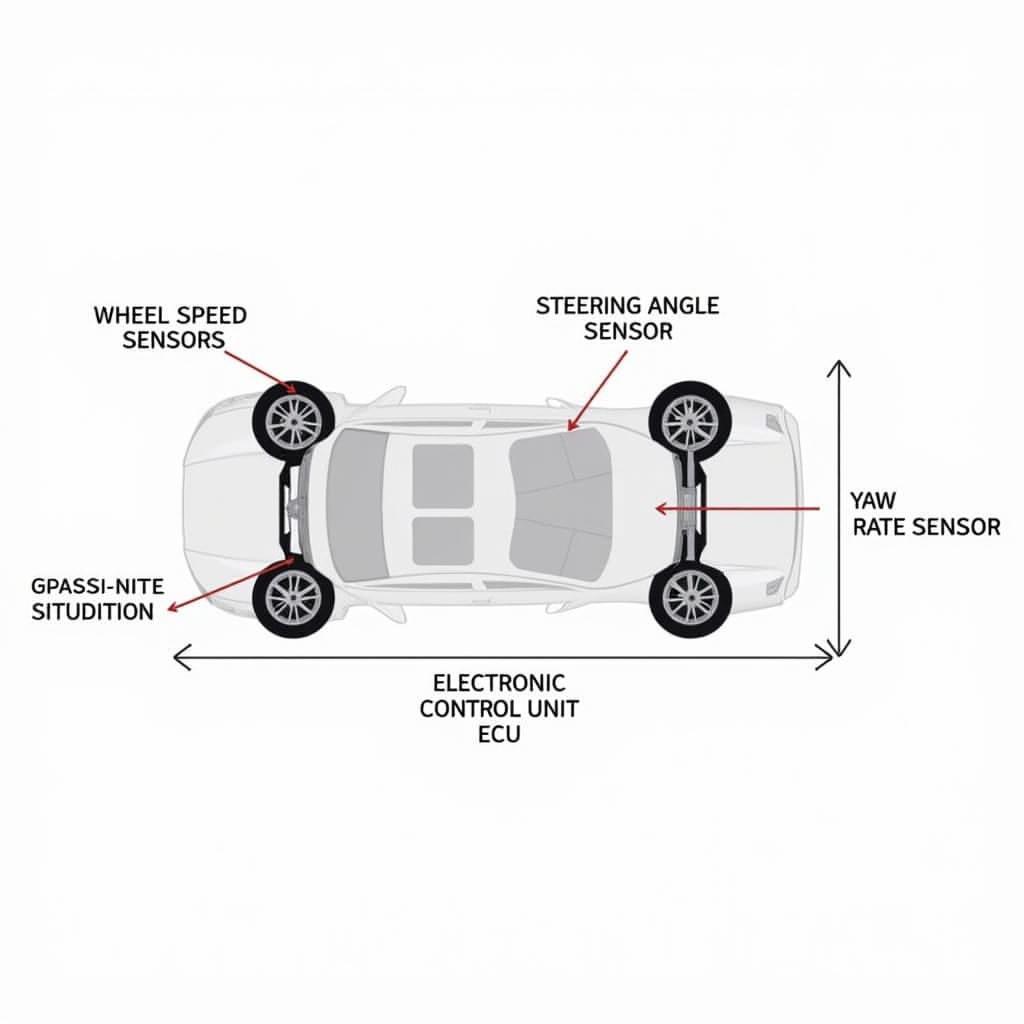What is ESC Service in Car?
Electronic Stability Control, commonly known as ESC, is a vital safety feature in modern vehicles that helps drivers maintain control during critical driving situations. By automatically applying brakes to individual wheels and managing engine power, ESC prevents skids and loss of control, significantly reducing the risk of accidents.
Imagine navigating a slippery curve or encountering unexpected obstacles on the road. These situations can cause your vehicle to lose traction, leading to dangerous skids. This is where ESC service comes into play.
How does ESC Service work?
ESC service relies on a network of sensors that continuously monitor your vehicle’s stability. These sensors track factors such as:
- Wheel speed
- Steering angle
- Lateral acceleration (side-to-side movement)
- Yaw rate (rotation around a vertical axis)
When the system detects a discrepancy between the driver’s intended path and the vehicle’s actual movement, it automatically activates to regain control.
Benefits of a properly maintained ESC System
A well-maintained ESC service offers numerous advantages, including:
- Enhanced Vehicle Stability: By preventing skids and maintaining traction, ESC helps you stay in control during emergency maneuvers.
- Reduced Risk of Accidents: Studies have consistently shown that vehicles equipped with ESC experience a significantly lower rate of single-vehicle crashes.
- Improved Handling: ESC can enhance your car’s overall handling, making it more predictable and easier to control, especially on slippery surfaces.
- Peace of Mind: Knowing that your car has a reliable safety net in challenging driving conditions provides invaluable peace of mind.
 Car's Electronic Stability Control System Components
Car's Electronic Stability Control System Components
Common Signs of ESC Service Issues
While ESC systems are designed for durability, it’s crucial to be aware of potential issues. If you experience any of the following, it’s essential to have your ESC service inspected by a qualified mechanic:
- Illuminated ESC Warning Light: A persistent ESC warning light on your dashboard indicates a potential problem with the system.
- Unusual Noises during Braking: Grinding, screeching, or clicking sounds during braking could signify a malfunctioning ESC component.
- Vehicle Pulling to One Side: If your car pulls to one side when braking, particularly during slippery conditions, your ESC system might require attention.
- Erratic Braking Response: Any unexpected or inconsistent braking behavior could be a sign of an ESC service issue.
Maintaining your ESC System for Optimal Performance
To ensure your ESC system remains in top condition, consider these maintenance tips:
- Regular Inspections: Have your ESC system inspected by a qualified mechanic during routine maintenance checks.
- Address Warning Lights Promptly: Never ignore an illuminated ESC warning light; promptly seek professional diagnosis and repair.
- Drive Cautiously in Adverse Conditions: While ESC enhances safety, it’s crucial to exercise caution and adjust your driving to suit adverse weather conditions.
 Car Maintaining Traction with ESC on a Slippery Road
Car Maintaining Traction with ESC on a Slippery Road
ESC vs. Traction Control: Understanding the Difference
While often used interchangeably, ESC and traction control are distinct systems that work in tandem to improve vehicle safety. Traction control primarily focuses on preventing wheelspin during acceleration, ensuring maximum grip when starting from a standstill or accelerating on slippery surfaces. On the other hand, ESC provides a broader scope of stability control, intervening during various driving maneuvers to prevent skids and maintain control.
[how often should you service an electric car](https://carserviceo.com/how-often-should you-service-an-electric-car/)
The Future of ESC Technology
As automotive technology continues to evolve, ESC systems are becoming increasingly sophisticated. Advanced features such as:
- Roll Stability Control: This feature helps prevent rollovers, a common occurrence in high-center-of-gravity vehicles like SUVs.
- Trailer Sway Control: By detecting and counteracting trailer sway, this technology improves stability and safety when towing.
These advancements further solidify the importance of ESC service in enhancing driver and passenger safety.
Conclusion
Understanding “what is ESC service in a car” is crucial for any car owner. This sophisticated safety system plays a vital role in preventing accidents and maintaining control in challenging driving situations.
By comprehending its functionality, benefits, potential issues, and maintenance tips, you can make informed decisions to ensure your vehicle’s safety and your peace of mind on the road. Remember, a well-maintained ESC service is an investment in your well-being and the well-being of others sharing the road with you.
FAQs
1. Is ESC standard on all cars?
While ESC has become increasingly common, it is not yet mandatory on all new cars. However, many manufacturers offer it as a standard feature on most of their models.
2. Can I temporarily disable my ESC?
Some vehicles allow temporary ESC deactivation, typically for specific situations like driving in deep snow or sand. However, it’s generally recommended to keep ESC enabled for optimal safety.
3. How much does it cost to repair an ESC system?
The repair cost for an ESC system can vary significantly depending on the make and model of your vehicle and the extent of the problem.
what does service stability mean in your car
4. How do I know if my ESC is working correctly?
Most vehicles have an ESC warning light on the dashboard that illuminates briefly when the system is activated. If the light stays on or flashes, it indicates a potential problem.
5. Can I install an ESC system in an older car?
Retrofitting an ESC system in an older car that didn’t come equipped with it from the factory is generally not feasible due to the complexity of the system and its integration with other vehicle components.
Common Situations Where You Might Have Questions about Your ESC Service:
- You see the ESC warning light flashing or staying on. This is a clear sign that you need to get your ESC system checked.
- Your car feels unstable or skids unexpectedly, especially in wet or icy conditions.
- You’re experiencing unusual noises or vibrations during braking.
Need Help with Your Car’s ESC Service?
Contact us today! We offer expert diagnostics and repair for all your car’s electronic systems, including ESC.
WhatsApp: +1(641)206-8880
Email: [email protected]
We have a 24/7 customer support team ready to assist you.

